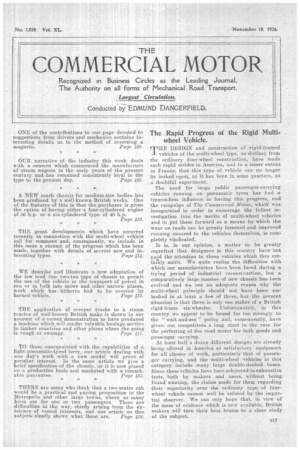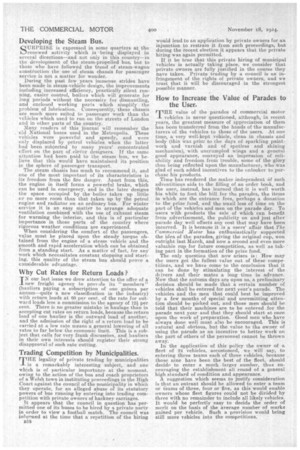The Rapid Progress of the Rigid Multiwheel Vehicle.
Page 1

Page 2

If you've noticed an error in this article please click here to report it so we can fix it.
THE DESIGN and construction of rigid-framed vehicles of the multi-wheel type, as distinct from the ordinary four-wheel construction, have made such rapid strides in America, and to a lesser extent in France, that this type of vehicle can no longer be looked upon, as it has been in some quarters, as a doubtful experiment.
The need for large public passenger-carrying vehicles running on pneumatic tyres has had a tremendous influence in forcing this progress, and the campaign of The Commercial Motor, which' was inaugurated in order to encourage the fullest investigation into the merits of multi-wheel vehicles and to put these forward as a means by which the wear on roads can be greatly lessened and improved running ensured to the vehicles themselves, is completely vindicated.
It is, in our opinion, a matter to be greatly regretted that designers in this country have not paid the attention to these vehicles which they .certaiilly merit. We quite realize the difficulties with which our manufacturers have been faced during a trying period of industrial reconstruction, but a comparatively large number of new chassis has been evolved and we see no adequate reason why the multi-wheel principle should not have been embodied in at least a few of these, but the present situation is that there is only one maker of a British rigid-frame six-wheeler. Unfortunately, in this country we appear to be bound far too. strongly to the " wait-and-see" policy and, consequently, have given our competitors a long start in the race for the perfecting of the road motor for both goods and passenger carrying.
At least half a dozen different designs are already being offered in America as Satisfactory equipment for all classes of work, particularly thatof passenger earring, and the Multi.-wheel vehicles in this category include .many large double-decked buses. Since these vehicles have been subjected to exhaustive tests, both by makers and users, without being found wanting, the claims made for them regarding their superiority over the ordinary type of fourwheel vehicle cannot well be refuted by the impartial observer. We can only hope that, in view of the mass of evidence which is now available, British makers will turn their best brains to a close study of the subject.
Developing the Steam Bus.
SURPRISE is expressed in some quarters at the renewed activity which is being displayed in several directions—and not only in this country—in the development of the steam-propelled bus, but to those who have followed the trend of steam-wagon construction the use of steam chassis for passenger service is not a matter for wonder.. During the past few years immense strides have been made in steam-vehicle design, the improvement including increased efficiency, practically silent running, easier control, boilers which will generate for long periods without the necessity for dismantling, and .enclosed working parts which simplify the problem of lubrication. Consequently, these chassis are much more suited to passenger work than the vehicles which used to rim on the streets of London and in other parts of the country. Many readers of this journal will remember the old National buses used in the Metropolis. These vehicles were powerful and speedy, and were only displaced by petrol vehicles when the latter had been subjected to ninny years' concentrated effort on the part of clever designers, If the same attention had been paid to the steam bus, we believe that this would have maintained its position in the sphere of passenger transport. The steam chassis has much to recommend it, and one of the most important of its characteristics is its freedom from the fire danger. Apart from this, the engine in itself forms a powerful brake, which can be used in emergency, and in the later designs the space occupied by the boiler takes up little or no more roam than that taken up by the petrol engine and radiator on an ordinary bus. For winter service it is an easy matter to arrange adequate ventilation combined with the use of 'exhaust steam for warming the interior, and this is of particular importance in those parts of the country where rigorous weather conditions are experienced. When considering the comfort of the passengers, value must be placed upon the steady torque obtained from the engine of a steam vehicle and the smooth and rapid acceleration which can be obtained from_ a standing start. As a matter of fact, for any work which necessitates constant stopping and starting, this quality of the steam bus should prove a considerable advantage.
Why Cut Rates for Return Loads ?
TN our last issue we drew attention to the offer of a
new freight agency to prov.tcle its " members " (hauliers paying a subscription of one guinea per annum—quite 'a new classification in the industry) with return loads at 60 per cent, of the rate for outward loads les_s a commission to the agency of 12iper cent. There is no greater mistake in haulage than in accepting cut rates on return loads, because the return load of one haulier is the outward load of another, and the admission of the right of a return load to be carried at a low rate means a general lowering of all rates to far below the economic limit. This is a subject that calls for very frank discussion, and hauliers in their own interests should register their strong disapproval of such rate cutting.
Trading Competition by Municipalities.
fr HE legality of private trading by municipalities is a remarkably interesting subject, and one which is of particular importance at the moment, owing to the action of the bus and coach proprietors of a Welsh town in instituting proceedings in the High Court against the council of the municipality in which they operate, for an alleged abuse of its statutory powers of bus running by entering into trading competition with private owners of hackney carriages. It appears that the council in question has permitted one of its buses to be hired by a private narty in order to view a football match. The council was informed at the time that a repetition of the hiring
rin
would lead to an application by private owners for an injunction to. restrain it from snch proceedings, but during the recent election it appears that the private hiring was again permitted. If it be true that this private hiring of municipal vehicles is actually taking place, we consider that private owners are fully justified in the course they have taken. Private trading by a council is an infringement of the rights of private owners, and we trust that it will be discouraged in the strongest possible manner.
How to Increase the Value of Parades to the User.
ITIHE value of the parades of commercial motor
vehicles is never questioned, although, in recent years, the greatest measure of appreciation of them has been transferred from the hands of the manufacturers of the vehicles to those of the users. At one time, a very well-kept vehicle, clean in chassis and body (this was prior to the days of sparkling paint work and varnish and of spotless and shining mechanism), with unerumpled wings and a general good appearance, conveyed an impression of reliability and freedom from trouble, some of the glory thus being reflected upon the manufacturer, who was glad of such added incentives to the onlooker to purchase his products. Time has rendered the maker independent of such adventitious aids to the filling of an order book, and the user, instead, has learned that it is well worth his while to foot the bill for the parades, the items in which are the entrance fees, perhaps a donation to the prize fund, and the small loss of time on the part of the vehicles and men on the parade day. To users with products the sale of which can benefit from advertisement, the publicity on and just aftei‘ parade day well offsets any cost that may have been incurred. It is because it is a users' affair that The Commticial Motor has enthusiastically supported the idea of the parades, giving the original cup, won outright last March, and now a second and even more valuable cup for future competition, as well as taking part in the formation of the prize fund. The only question that now arises is : How may the users get the, fullest value out of these competitions., and we have come to the conclusion that it can be done by stimulating the interest of the ivers and their mates a long time in advance. Now that the autumn days are upon us, a preliminary decision should be made that a certain number of vehicles shall be entered for next year's parade. The vehicles and the men that could best be improved by a few months of special and unremitting attention should be picked out, and those men should be told that their machines are to be entered for the parade next year and that they should start at once upon the work of preparation. Good men who have always done well must also be encouraged. This is natural and obvious, but the value to the owner of using the parade as an incentive to better work on the part of others of the personnel cannot be thrown away. In the application of this policy the owner of a fleet of 24 vehicles, accustomed, we will say, to entering three teams each of three vehicles, because those nine have been the best of the fleet, should decide to enter a much larger number, thus encouraging the establishment all round of a general high standard of condition and appearance. A. suggestion which seems to justify consideration is that an entrant should be allowed to enter a team or teams of three, four or five, as this would enable owners whose fleet figures could not be divided by three with no remainder to include all likely vehicles. It would be perfectly easy to decide the order of merit on the basis of the average number of marks gained per vehicle. Such a provision would bring still more vehicles into the competitions..
































